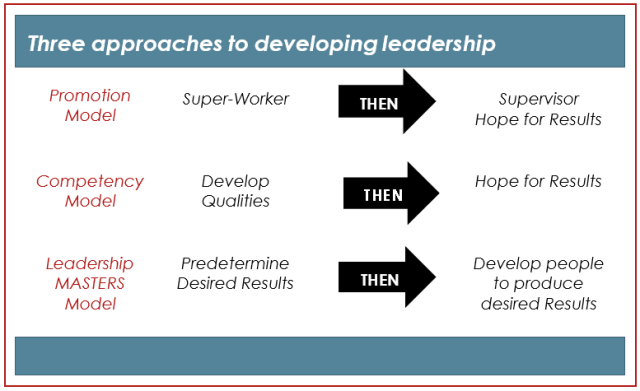Organizations typically take one of three approaches to management succession and leadership development.
The Promotion Model: The most common process for ascending into formal management roles goes something like this: on Friday, you are commended for being a “super worker”, so on Monday you get to be a supervisor. That’s it. Any questions? Somehow, over the weekend or the months and years to come, you must figure out what it means and what it takes to lead effectively. Maybe you find a mentor, take a class, or read a book or two; maybe not. In this way, we have many leaders who learned about leadership the same way they learned about sex: either from theory, from their peers, by experimenting, or from someone who professes to be slightly more “experienced”. And how accurate is that?
The Competency Model: The second means of leadership development is becoming more common, especially in large corporations and open-enrollment programs. In this case, a dozen or so “leadership competencies” have been identified as important; prospective or new leaders participate in a series of training modules, field trips, and projects based on those competencies. At best, participants are assessed on the degree to which they embody each competency and they may be measured against a baseline.
The idea with this second model comes straight out of the industrial age – that if we take everyone through the same, homogenous “assembly line” we end up with a group of leaders who are similarly effective: you might call this the “car wash” approach to leadership development in that the hope is that participants come out “clean”. In effect, this type of process produces a static management culture rather than effective leadership leveraging a multitude of unique talents necessary for innovation and sustained success amid market challenges. In effect, leaders are measured on the equivalent of a grading curve right out of secondary school.
In method one, we place people into leadership roles and hope they produce desired results. In method two, we train people in a particular way, and hope they produce desired results. Can you allow hope to be the only outcome of your leadership development efforts?
Leadership MASTERS uses a third method: we help participants and their organizations determine their desired business results first, then we develop people who will lead others to produce those desired results. The focus is on the results and how they are produced rather than just the individual leadership attributes, which may vary based on the inherent strengths of the leaders. The organization wins because it now has self-motivated leaders, intent on achieving business goals, while aspiring leaders win because they can measure their impact in the achievement of their own goals and in the performance of their followers.

Leadership MASTERS is a program developed and facilitated by Executive Coach Mark Sturgell, CBC, for the Greater Decatur Chamber of Commerce in Decatur, IL. It provides intensive character and results-based coaching, collaborative learning, and training to develop “bench strength” of future leaders within local businesses, non-profits, and government entities – influencers at all career stages capable of leading others to produce desired organizational results. For more information click here, including registration, executive summary, white paper, schedule a complimentary coaching session, and other preview opportunities.
